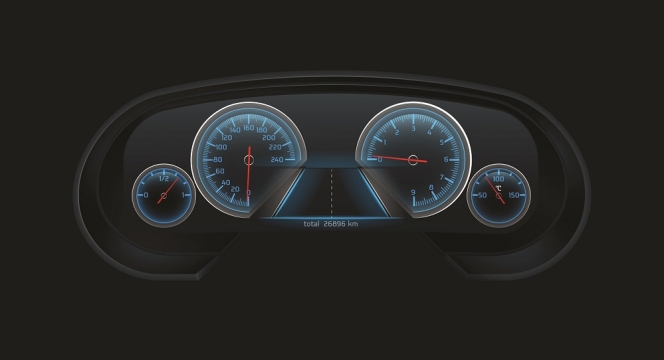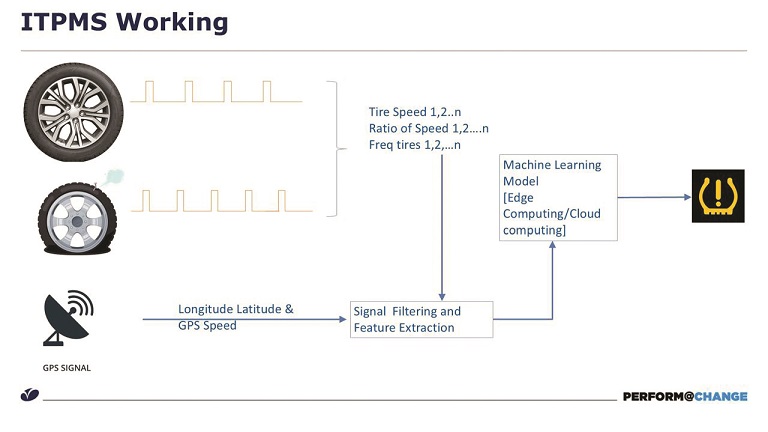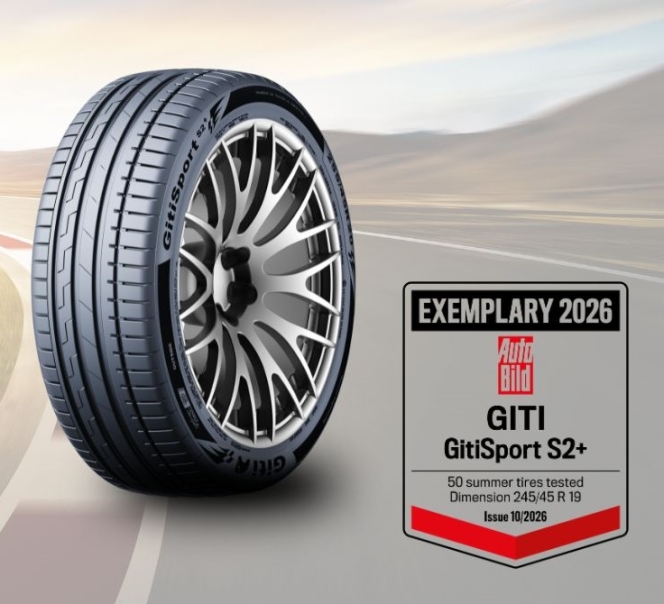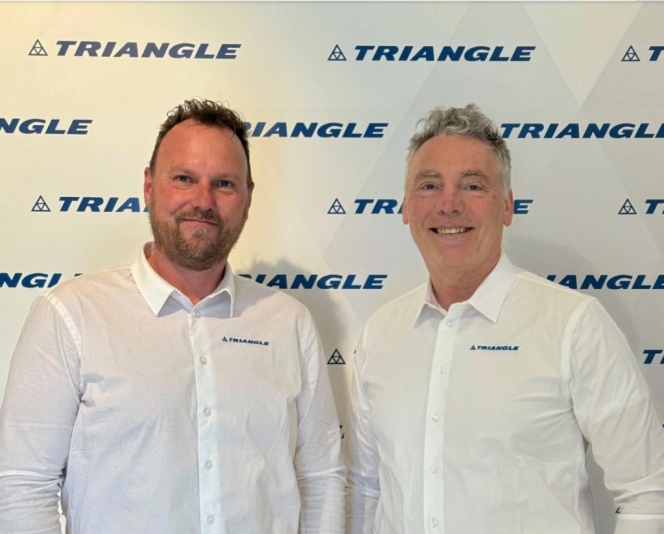Varroc Aims To Leverage GPS And ABS Sensors To Provide TPMS Data
- By Nilesh Wadhwa
- January 09, 2025

The Tyre Pressure Monitoring System (TPMS) tech, despite its huge safety benefit, is still seen as a premium feature in most mass-market passenger vehicle segment and two-wheelers in India. Aurangabad-based component supplier Varroc’s Indirect TPMS with over 90 percent accuracy aims to make smart inroads. Tier 1 automotive supplier Varroc is looking to harness the data from GPS sensor and Anti-Lock Braking System (ABS) sensors to provide tyre pressure information to two-wheelers and four-wheelers.
The company is looking to make smart gains through Indirect Tyre Pressure Monitoring Systems (ITPMS), which rely on existing sensors in a vehicle to generate the information without compromising on quality and time-lag.
 Fritz Abraham, Chief Technology Officer, Varroc, told Tyre Trends that “the direct TPMS uses pressure sensors at the air inlet of each tyre and communicates the information to the vehicle dashboard using wireless communication or through complex harness. This is not only expensive but also require heavy maintenance. If there exists a solution that can use the existing sensors and provide the information of tyre pressure, it is the ‘Indirect/Intelligent Tyre Pressure Monitoring System’. This system provides information of the tyre pressure without the need of a pressure sensor.”
Fritz Abraham, Chief Technology Officer, Varroc, told Tyre Trends that “the direct TPMS uses pressure sensors at the air inlet of each tyre and communicates the information to the vehicle dashboard using wireless communication or through complex harness. This is not only expensive but also require heavy maintenance. If there exists a solution that can use the existing sensors and provide the information of tyre pressure, it is the ‘Indirect/Intelligent Tyre Pressure Monitoring System’. This system provides information of the tyre pressure without the need of a pressure sensor.”
The radius of the tyre changes with respect to air pressure and hence the linear displacement per one rotation of tyre changes with respect to the pressure. The linear displacement can also be measured using GPS by calculating the rotational speed of the wheel and radius of the tyre.
The ITPMS solution simply put is a software stack that can be integrated with Varroc’s cluster and telematics solutions. The machine learning (ML) software analyses various parameters set by the company to provide tyre pressure reading to the user. Since it does not require any additional TPMS hardware, it is substantially cheaper compared to solutions using battery-based sensors.
“The ITPMS exploits the deviations in linear displacement with respect to wheel rotations and predicts the tyre pressure. This relation is not straightforward; it is a complex method to derive the mathematical equations. Hence, ML techniques are used to quantify the relation,” said Abraham.
The ITPMS primarily requires a GPS sensor (telematics data) and ABS, which is integrated during the vehicle assembly level. Varroc states that OEMs will be able to provide access to the tyre pressure on any HMI (Human-Machine Interface) device like the vehicle instrument cluster, vehicle telematics and connectivity app, among others, to easily provide the information of the tyre pressure.
Varroc had initially initiated the development of the ITPMS specifically for two-wheeler applications. The company mounted a GPS device on a two-wheeler equipped with ABS. It collected the data during vehicle operation across varied scenarios, including differing tyre pressures, diverse road conditions and various weather conditions such as sunny and rainy days.
“This data was then post-processed and analysed using data science and machine learning techniques to develop a model that accurately captures the relationship between tyre pressure, wheel speed and the speed as measured by the GPS. This model forms the foundation for understanding and monitoring tyre pressure indirectly using available data points from the vehicle’s operation,” he shared.
Demand scenario for TPMS
It is no secret that while TPMS technology has been around for more than a couple of decades, its adoption in India still remains a very small percentage. In India, most TPMS solutions available in the OE as well as aftermarket are Direct TPMS.

They are said to have their own set of challenges, such as its reliability due to varying temperatures, environmental and climatic conditions. Then there are the challenges associated with wireless communications. Sensor battery issues and cost too are deterrent factors.
On the other hand, the small percentage of vehicles that utilise existing ITPMS categorise the tyre pressure in broad classifications (low pressure or high pressure). They do not provide precise measurements, which limits their adoption and effectiveness in ensuring optimal tyre performance and safety.
However, Varroc already has developed the ITPMS to provide basic information (low or high); now it is in advanced stages of development to provide precise tyre pressure information with over 90 percent accuracy. While the company has been tight-lipped about the introduction of the solution in the market, Varroc is said to be in discussions with its clients to bring it to the market soon.
Abraham further shared, “The primary reason for the limited adoption of TPMS is cost. Premium segment vehicles often include TPMS as a standard feature due to the higher price range, making it more feasible to absorb the associated costs. In contrast, aftermarket TPMS solutions are generally expensive and demand ongoing maintenance, which can be a deterrent for many vehicle owners. Additionally, there is a general lack of awareness regarding the importance of maintaining optimal tyre pressure. Many drivers may not fully understand the safety, performance and fuel efficiency benefits of consistent tyre pressure monitoring, further impacting the adoption rate of TPMS systems.”
As per the company, the ITPMS comes with self-learning feature and is designed with 80 percent cold tyre pressure threshold and tested per AIS 154. The threshold can be further optimised and customised as per the requirement of the customer.
Giti Tire Unveils Next-Generation GitiSportS2+ Following AutoBild Test Success
- By TT News
- March 05, 2026

Giti Tire has launched its new ultra-high-performance GitiSportS2+ tyre, following an outstanding result in the AutoBild 2026 Summer Tyre Test, where it received one of the most prestigious independent endorsements in Europe. Rated as exemplary by the leading German publication, the tyre secured fourth place overall out of an initial field of 50 competitors. The evaluation praised its exceptional value for money, impressive driving dynamics and substantial safety margins.
Tested on a BMW 5 Series using the 245/45R19 size, the tyre initially shared fourth position based on wet and dry braking performance, recording a total stopping distance of 42.5 metres. It maintained this high standard across 12 additional assessments, ultimately ranking among the top five alongside several premium manufacturers. The new model is scheduled to be available from spring 2026, launching in 19 sizes covering rim diameters from 17 to 20 inches, widths between 225 and 255 and aspect ratios from 35 to 55.
Designed for sporty cars and powerful SUVs, the GitiSportS2+ features a newly engineered compound that reduces wet braking distances by eight percent and dry braking by two percent compared to its predecessor. It also achieves the highest possible EU Wet Grip label rating of ‘A’. In line with the manufacturer’s broader strategy, the tyre bears the AdvanZtech EV Ready sidewall marking, indicating its compatibility with internal combustion engines, mild hybrids, plug-in hybrids and battery electric vehicles.
During the initial rollout, many existing sizes of the original GitiSportS2 will remain on the market, ensuring continued coverage across the sport vehicle segment. Development took place at Giti’s European R&D Centre in Hannover, with testing and fine-tuning conducted at tracks in UK and Spain. The project leveraged the company’s AdvanZtech technology, a globally integrated research and development system.
Fabio Pecci-Boriani, Deputy General Manager – Product Planning PCR and LTR, Giti Tire R&D Centre (Europe), said, “The new GitiSportS2+ is testimony of the achievements that our engineers, testers and manufacturing facilities have been able to deliver in the area of performance while retaining the sustainability, endurance and mileage criteria that are important to the daily driver. To launch a tyre off the back of an ‘exemplary’ rating in AutoBild is nothing short of sensational; we are thrilled that one of the leading automobile titles in Europe has been able to validate and confirm our latest development and we are excited to share this news with our trusted customers.
“The target criteria for the GitiSportS2+ was to deliver further improvements in dynamic driving, enhanced control on wet roads with precise and exciting control on dry roads, all while maintaining the mileage and energy efficiency of the previous generation. Sportiveness is at the heart of the tyre with a particularly stiff design that contributes to stability at high speeds as well as in cornering. The increased grip performance goes is more precise, firm, predictable and constant.”
Halfords Appoints Jessica Jones As Director Of Fleet Solutions
- By TT News
- March 05, 2026

Halfords has signalled a strategic push into the B2B mobility market by naming a new leader for its fleet division. Jessica Jones is set to become Director of Fleet Solutions from the start of April 2026, tasked with accelerating growth in this area. She arrives with considerable expertise in the fleet, leasing and B2B mobility sectors, having spent her career guiding national account teams and forging strong customer relationships that have driven commercial success.
Her background encompasses strategic fleet management, business expansion and the creation of adaptable service models for corporate clients. Prior to this appointment, Jones served as Sales Director at Sixt UK and held the position of Director of National Fleet Sales at ATS Euromaster. Her recruitment underscores Halfords' commitment to developing its fleet services as a core area for expansion.
The company aims to support businesses by utilising its extensive network of garages to provide integrated maintenance and mobility services. These offerings are designed to maximise vehicle availability and assist companies in controlling operational expenditure.
Adam Pay, Managing Director of Garages at Halfords, said, “Fleet is a significant growth opportunity for Halfords, and Jess brings deep sector expertise alongside a strong track record of building high-performing teams and customer partnerships. As fleets face increasing cost pressures and operational complexity, our national scale and service capability position us strongly to support customers. Jess’s leadership will help us accelerate momentum and unlock further opportunities in this important market.”
Jones said, “I’m delighted to be joining Halfords at such an exciting point in its growth. The business combines a trusted consumer brand with a powerful national servicing network, creating real potential in fleet. I’m looking forward to working with colleagues and customers to build on the strong foundations already in place and further develop a differentiated, customer-focused fleet offering.”
Triangle Tyre Appoints Federico Parmesan As European OTR Technical Manager
- By TT News
- March 04, 2026

Triangle Tyre has significantly strengthened its European off-the-road operations with the appointment of Federico Parmesan as the new European OTR Technical Manager, a position he assumed on 1 March 2026. This strategic appointment represents a key milestone in the company's ongoing efforts to enhance its technical capabilities and expand its market presence across the continent's specialised tyre sector.
Parmesan brings more than three decades of tyre industry experience to his new role, with particular expertise concentrated in OTR and earthmoving applications. His extensive background encompasses not only deep technical knowledge but also a comprehensive understanding of the challenges faced by dealers and end-users operating in demanding environments. This combination of technical proficiency and practical insight positions him to effectively bridge the gap between product development and real-world application requirements.
In his new capacity, Parmesan will work closely with Triangle's partner network throughout Europe, providing support for both aftermarket and original equipment segments. His responsibilities include strengthening the company's field application expertise and contributing directly to the continued development of the OTR product portfolio. These efforts aim to deliver enhanced value and service to partners across the region.
The appointment reflects Triangle's strategic priority of reinforcing its technical structure to support ambitious growth objectives in the European OTR segment. The company seeks not merely to consolidate its existing market share but to achieve sustainable expansion while elevating support levels for its partners. Parmesan's extensive experience, energetic approach and positive attitude are expected to prove invaluable assets as Triangle pursues these goals and strengthens its position within the competitive European market.
ATF Tyres Appoints Rajesh Vyas As Vice President Of Sales And Marketing
- By TT News
- March 03, 2026

ATF Tyres, one of India’s leading manufacturers of off-highway tyres, has announced the appointment of Rajesh Vyas as its new Vice President of Sales and Marketing. Vyas brings over 25 years of global experience to the role, having worked across diverse international markets to build high-performance sales teams and enhance distribution networks.
His professional background includes leadership roles in brand positioning and product portfolio expansion within competitive sectors. Prior to joining ATF, Vyas served as Vice President at Rubber King Tyre Group. He also held key positions at Balkrishna Industries Limited as Head of Mining Tyres for India and spent a decade at Apollo Tyres Ltd as Business Head for Off-Highway Tyres.
With the company working to expand its footprint in the agricultural, industrial and OTR segments worldwide, Vyas’s strategic leadership and commercial insight are expected to support ATF Tyres in delivering performance-driven solutions across multiple regions.







Comments (0)
ADD COMMENT